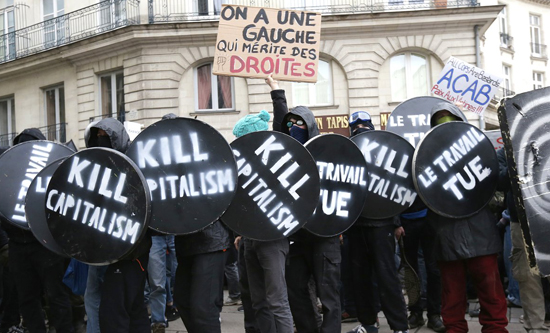
On 17 March 2016 a new labour bill was introduced into the French National Assembly. The El Khomri Law (nicknamed after the Labour Minister who introduced it) proposes extending the maximum working day from 10 to 12 hours, and working week from 48 to 60 hours. Currently, overtime pay begins at 35 hours per week, and is 25% for the first eight hours (up to 43) and 50% for anything more. The proposed law allows ‘collective bargaining’ agreements to reduce overtime pay to just 10% and makes it easier for employers to fire workers, and severely limit compensation available from tribunals, where there is currently no limit.
Deputies on the ‘left’ of the ruling Socialist Party offered mild resistance. On 14 April, President Hollande vowed to push ahead with the bill. On 10 May, Prime Minister Manuel Valls announced that the government would force the bill through the Assembly without a vote, using Article 49.3 of the constitution. On 11 May, Socialist Party deputies who opposed the law were faced with the choice of opposing the law or opposing their government in a vote of confidence. They sided with the government, allowing Valls to push the bill into the Senate, where it awaits approval.
Unions have led a series of strikes, most notably the CGT’s blocking of petrol supplies, and its 25 May promise to shut down the country’s vital nuclear power facilities. On 25 May, every single petrol refinery in the country was on strike and 40% of petrol stations were affected.
A mass protest movement known as Nuit Debout, which translates as ‘night on our feet’ has sprung up. The word debout is symbolic as the French for ‘Arise!’ in the Internationale. The first demonstration against the Bill was held in Paris on 9 March. The largest so far, on 31 March, attracted 390,000 according to French authorities and 1.2 million according to the unions CGT and FO. Following November’s terrorist attacks, France remains under a state of emergency prohibiting mass demonstrations (see FRFI 243). On 11 April, police evacuated the occupied Place de la République in Paris. The protesters were permitted to return that evening.
The demonstrations have spread to some 60 towns and cities in France, and to Belgium and Spain. RCG comrades and supporters have joined demonstrations supportive of Nuit Debout in Glasgow and Edinburgh. Protesters have not set out specific demands. Some, particularly in Paris and Marseilles, are attempting to extend the ‘movement’ to the banlieues (suburban working class neighbourhoods), to reach the black and Muslim population who will be worst hit by the El Khomri law due to their predominance in lower-paid, less secure work, and who suffer the racist repression of the French state (see FRFI 178 and 188).
On 27 April, the CGT sent a delegation to the Place de la République, but it seems the two movements remain only loosely connected.
As of 26 May, 36 people have been arrested in Paris in clashes with the police, and 77 in the country as a whole. Videos show police clubbing protesters who have fallen to the ground, and spraying tear gas directly into protesters’ faces. At Cherbourg, where CGT members blocked access to the nuclear power station, one person has been killed and another seriously injured.
On 26 May, CGT strike action prevented the printing of every daily newspaper, with the exception of L’Humanité, the only paper running CGT secretary Philippe Martinez’s opinion piece on the strike actions. As of 26 May, six of France’s eight petrol refineries have been closed down by the CGT.
The CGT’s campaign has directed attention away from the Nuit Debout movement due to its militancy and organised campaign with specific demands. The CGT is fighting for public sector workers and skilled workers in nuclear facilities and oil refineries. They now need to line up with black and women workers who often already work the kinds of hours and conditions that the El Khomri Law threatens to impose.
Socialist Party politicians have lined up to express ‘sympathy’ with the demonstrations, all while Interior Minister Bernard Cazeneuve has made good on his promise to use police repression. The labour aristocracy and middle class left, represented by the Socialist Party, ‘sympathise’ with demonstrators, but sympathise far more with protecting their own privileged position at the expense of the more oppressed, mainly Muslim, Arab and black, sections of the working class. This is becoming ever more difficult as the crisis of capitalism begins to affect even the labour aristocracy.
At the time of going to press, the government has not been deterred from pushing the law through, and the unions vow to continue their opposition.
Séamus Padraíc
Fight Racism! Fight Imperialism! 251 June/July 2016




